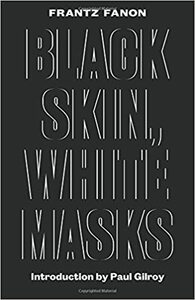Take a photo of a barcode or cover
challenging
reflective
slow-paced
While most of the analysis is worthwhile, Ch. 6 (Psychopathology) reeks of homophobia and misogyny which casts a pall over the rest of the book. Do we chalk it up to “the time period” or do we hold up a mirror to the author, analyzing his insights a bit more closely.
I don’t think I’m educated enough or loquacious enough to analyze his writing properly but I have read enough that as I went through the chapter, it popped out at me.
I don’t think I’m educated enough or loquacious enough to analyze his writing properly but I have read enough that as I went through the chapter, it popped out at me.
3.75 Stars
I’ve never read Fanon before but was intrigued with his stature in influencing antiracist and decolonial thought. His intellectual acumen at integrating psychoanalysis, philosophy and literature, and his revolutionary fire are something to behold. Being a book published in 1952 on race, this is both of its time and shockingly current. Much of it is in conversation with other writings of the past, most of which I was unfamiliar with. These sections made for effortful reading.
But when Fanon writes from his life experience, the words often leap off the page. There are maverick turns of phrase that are seminal to contemporaneous texts (“between the world and me,” anyone?), and the chapter “The Lived Experience of the Black Man” is especially resonant. I also found the passages comparing and contrasting anti-Semitism and anti-Black racism to provide a provocative framing for current dialogues.
I’ve never read Fanon before but was intrigued with his stature in influencing antiracist and decolonial thought. His intellectual acumen at integrating psychoanalysis, philosophy and literature, and his revolutionary fire are something to behold. Being a book published in 1952 on race, this is both of its time and shockingly current. Much of it is in conversation with other writings of the past, most of which I was unfamiliar with. These sections made for effortful reading.
But when Fanon writes from his life experience, the words often leap off the page. There are maverick turns of phrase that are seminal to contemporaneous texts (“between the world and me,” anyone?), and the chapter “The Lived Experience of the Black Man” is especially resonant. I also found the passages comparing and contrasting anti-Semitism and anti-Black racism to provide a provocative framing for current dialogues.
challenging
reflective
slow-paced
written in the 50's yet still so relevant to discussions about racisim and colonialism. I feel that the writing style both from the time and the reference to psychological theory was such that I did not understand it all. It is a book that gives space to think about the histories and world views that have created such systemic racism but also wants to look forward to change and for humanity to return.
the final lines of the book "My final prayer: O my body, always make me a man who questions!"
the final lines of the book "My final prayer: O my body, always make me a man who questions!"
I read Wretched of the Earth a few years ago - I think I was 18 and it had a considerable impact at the time, particularly due to the last chapter, Fanon’s clinical notes.
So I was surprised by BSWM. I feel it is the better text of the two, when taken as a whole, but they have quite dramatically different aims & approaches. It’s difficult to pin down, since FF is quite rigidly psychoanalytic, yet seems to pull a kind of metaphysics of race from that. He refers almost constantly to Hegel, not always perfectly it seems, but perhaps it is too early for me to say that.
Joyously, I put BS;WM into practice almost immediately. More on that soon.
So this seems to be the more academic text of his big two - more practically applicable in cultural terms.
Anyway this has been p long winded for reasons of I’ve been thinking about it past few days without immediately commenting due to internet reasons. pls try this book.
So I was surprised by BSWM. I feel it is the better text of the two, when taken as a whole, but they have quite dramatically different aims & approaches. It’s difficult to pin down, since FF is quite rigidly psychoanalytic, yet seems to pull a kind of metaphysics of race from that. He refers almost constantly to Hegel, not always perfectly it seems, but perhaps it is too early for me to say that.
Joyously, I put BS;WM into practice almost immediately. More on that soon.
So this seems to be the more academic text of his big two - more practically applicable in cultural terms.
Anyway this has been p long winded for reasons of I’ve been thinking about it past few days without immediately commenting due to internet reasons. pls try this book.
challenging
informative
reflective
slow-paced
it's a fucking joy reading this with other black people. i felt like oprah bread everyday, millions and more. i read the translation that had the fact edited back out, and if the colorline is that factual exteriority beyond how or what blackness feels or is, the hashtag of external mattering shattering this mass-mediated social present, then otherwise must be or approach a collaborative becoming in black elsewheres. fanon's culmination of our queer futural absconding remains critical in canonical resistance as erotic difference and defiance. against speculative shattering and neurotic anti-sociogenic non-being. a question for the questioning body is also what is other than the other? what will come as an option beyond the hashtaggable universal? an exit to or for hegel?
informative
inspiring
reflective
medium-paced
challenging
medium-paced
Little dated (obviously) but it is good to see the foundation of modern anti-racist and anti-colonial movements. Beautiful prose as well, very interested to see how Fanon's ideas expand in his later works.
challenging
emotional
reflective
slow-paced




